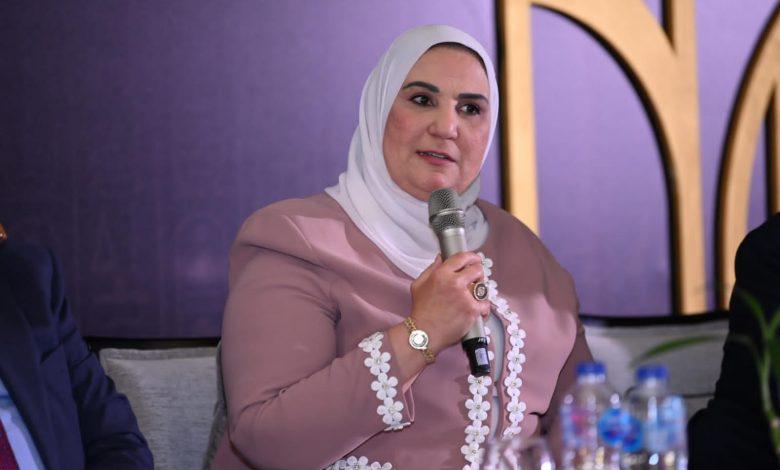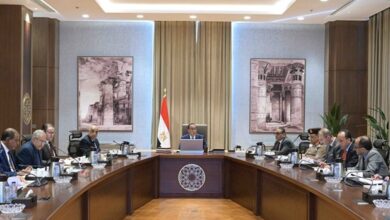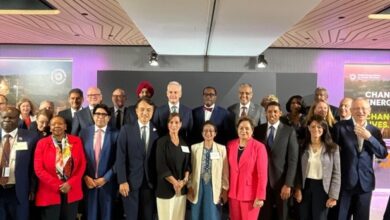On behalf of the President, Al-Qabbaj delivered a speech at the opening of the third annual conference on sustainability
By:aya Mahmoud elmenshawy

Ms. Nevine Kabbaj, Minister of Social Solidarity, delivered a speech ،On behalf of the President of the Republic, at the opening of the activities of the third annual conference on sustainability under the title “Business Sector Partnerships … Towards More Efficient Sustainable Solutions”.
Which is held under the auspices of Mr. President Abdel Fattah El-Sisi, President of the Republic, and organized by the Orman Association and Shefaa El-Orman Hospital in cooperation with the Federation of Egyptian Industries in Luxor Governorate, in the presence of Mr. El saad El-Kaseer, Minister of Agriculture and Land Reclamation, Dr. Mohamed Maait, Minister of Finance, and Ambassador Suha El-Gendy, Minister of State for Immigration and Affairs of Egyptians Abroad, in addition to a number of representatives of civil society organizations, the private sector, banks, and media professionals,The Minister of Social Solidarity conveyed to the attendees the greetings of President Abdel Fattah El-Sisi, President of the Republic, and conveyed to them his Excellency’s wishes for success and success for the annual conference on sustainable development in its third edition.
And that this meeting should result in constructive dialogues, acquired knowledge, effective recommendations, and implementable and effective results in achieving the sustainable development that the Arab Republic of Egypt aspires to, for both present and future generations.
Al-Qabbaj emphasized that the concepts of sustainable development have become a reality that must be applied, as it is the only way to preserve our natural, human and knowledge resources, and it contains within it the right of future generations to life.
Therefore, we must work to localize it in policies and programs, noting that everyone has confirmed that economic development alone does not guarantee achieving sustainability, so social dimensions must be taken into account, and we must all adhere to applying environmental sustainability standards in order to preserve peoples and the planet.
Al-Qabbah went on to say that it is necessary to put the vision of achieving the goals of sustainable development 2030 in mind at a time when Egypt and the world are facing
I gather grave challenges on the various economic, social, environmental and political levels, and everyone must confront these challenges and overcome them by gathering ranks and strengthening joint action, and by preserving the unity of our positions in order to preserve the security of society and the public interest of the people.
Al-Qabbaj explained that the Egyptian government is proud of its relations with the partners of civil society, and these relations extend their roots in the depths of history, and grew strongly during the second half of the twentieth century and increased in recent years until civil society became one of the three main pillars that constitute the renaissance of society in partnership with the government and the private sector in A balanced relationship based on complementarity and respect
Balanced, based on complementarity and respect,The Minister of Social Solidarity congratulated the National Alliance for Civil Development Action, which passed one year after its inception and achieved wide impacts on local communities and development, wishing it success.
Al-Qabbaj indicated that the Egyptian state has adopted a model for economic reform since the beginning of 2015, to enhance the state’s capabilities to face crises, and Egypt experienced during the Covid 19 pandemic, and succeeded in dealing with the crisis and crossing it, and with regard to sustainable development goals, Egypt adopted the following programs: Programs Social protection to alleviate poverty, including cash support programs that have increased by 400%, expansion of food support and bread support that has increased by about 300%, sacrificial instruments, support for irregular employment, and an increase in pensions and insurance by approximately 57%.
In addition to health care programs that include 100 million health care programs, treatment of hepatitis C, women’s and children’s health, the first thousand days in a child’s life, expansion of early detection of genetic diseases of newborns, early detection of renal impairment, treatment of chronic diseases, and detection of anemia and dwarfism. for schoolchildren.
The state’s support extended to the field of education, and the Egyptian state directed more than 1 trillion pounds to government spending on the education sector since 2014, with a growth rate of 158% compared to the eight years that preceded it. Annual government spending directed to the sector increased from 84 billion pounds in 2014 to nearly 200 billion pounds in 2022, and public investment directed to the education sector during the same period exceeded 194 billion pounds, with a growth rate of 442%.
As for sanitation and clean water, the state has only expanded water connection projects, home restoration and upgrading, in addition to programs for eliminating slums and unsafe areas, a decent housing program, a decent life program, seawater desalination programs, and rationalizing the use of irrigation used in agriculture.
The Minister of Social Solidarity confirmed that the National Climate Change Strategy 2050 has been launched, and Egypt has taken serious steps towards improving the efficiency of thermal power plants, improving transport and road networks, developing the green economy, issuing green bonds, and promoting green banking and green lines of credit.
Egypt has succeeded in hosting and managing the CoP27 climate summit with remarkable success, despite the circumstances it faced during that period, and raised issues of climate change, food security and energy security on the international agenda, in addition to stimulating international pledges, mobilizing financing and advocating for fair distribution to the countries most affected by the repercussions. Climate change.
In addition, the National Strategy for the Empowerment of Women 2030 was issued, as well as budgetary legislation that protects women from all forms of discrimination and violence, and the expansion of economic empowerment by increasing the share of funding allocated for economic and political empowerment to reach about 200 billion pounds. Protection of persons with disabilities, the Child Law, and the upcoming Elderly Law to be passed to ensure equality and non-discrimination against any group.
Al-Qabbaj made several recommendations at the end of her speech, summed up in the necessity of civil society in activating economic and environmental initiatives, consolidating energy rationalization practices, recycling agricultural, solid and electronic waste, promoting behaviors to preserve the environment from pollution, reducing the volume of heat emissions and limiting the consequences of climate change.
She also stressed the necessity of the business community’s commitment to applying sustainability standards and integrating them into their practices, working to achieve the concept of citizenship in partnerships, taking into account the rights of workers, in addition to adopting policies to reduce greenhouse gas emissions to avoid the effects of climate change from which we all suffer.
The recommendations were complemented by the necessity of continuing to increase the share of renewable and alternative energy sources, establishing wind farms and solar power plants, and improving the efficiency of thermal power plants, in addition to the importance of supporting farmers and expanding food security projects, green agricultural economy, smart agriculture, and following mechanisms to rationalize the use of irrigation water.
There was a strong emphasis on limiting the increasing population growth to the maximum extent possible to maintain the balance of economic growth with population growth, and to ensure the solidarity of the various state agencies to ensure the provision of family planning methods, and to enhance community awareness, and to maximize the productive role of women in relation to their reproductive role, and to spread health clinics reproduction in rural and remote areas.
Al-Qabbaj concluded with the necessity of applying consumer protection laws and procedures, protecting different groups of people from the greed of merchants, not being complacent about price manipulation, product quality, or the safety and health of the citizen, and solving consumer problems.











